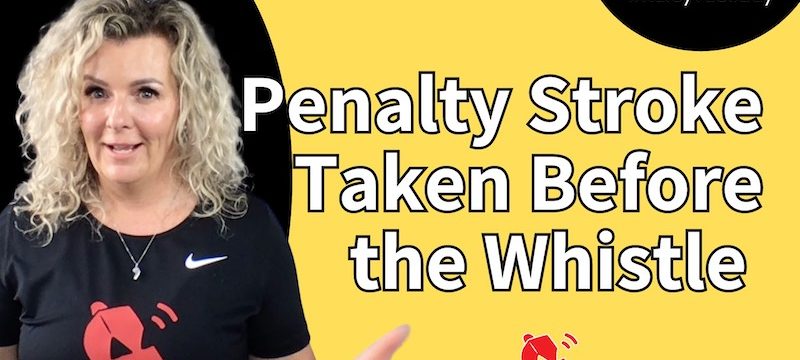How do the rules of hockey deal with stroke takers who jump the whistle? Learn how to make the right call and prevent it from happening in the first place in this #RuleyTuesday!
Skip to 6:03 if you're tight for time, as this is an edited version with an extra big piece of mea culpa and personal disclosure on the front end. Whether you see it or not, thanks for your support.
0:00 Intro and mea culpa about messing up with a rule of field hockey
1:01 Why we always need to take a broad view of a rule
1:38 Thank you for your trust, I take it seriously!
3:18 Mental health interlude
6:03 Intro to penalty strokes taken before the whistle
6:28 Rule 13.7 (f) and (g)
6:56 Awarding the retake
7:09 Allowing the take to stand under the advantage rule
7:34 How to talk to the players before you blow the whistle to start the penalty stroke
Transcript
Hey Friends! I’m Keely Dunn of FHumpires with another Ruley Tuesday, a hot take on just one rule in the book.
Penalty strokes taken by the attacker before the whistle blows: what’s up with that? Anchors up!
Rule of Hockey 13.7(f) and 9(g) – Taking the Penalty Stroke
(Prince of Wales) Crispy Phillips Adams hit me up to ask what we do when the penalty stroke is taken before you’ve blown the whistle. This is covered in rule 13.7(f) and (g):
When taking a penalty stroke, the whistle is blown when the player taking the stroke and the player defending it are in position.
The player taking the stroke must not take it until the whistle has been blown
Guidance: The player taking the stroke or the player defending it must not delay the taking of the stroke.
Pretty clear, right? But as always, the trick is in the application.
First off, if an attacker decides to take the stroke early and they score, you give them a dirty look, award a retake according to rule 13.9(a). Smooth sailing.
Now, if they miss wide or the goalkeeper makes a save, they’ve still committed a foul under 13.7(g), but you can simply allow that take to “stand” as it were. A 15m free hit or an outright free hit, doesn’t really make much difference.
No More Questions!
But there’s a reason I kept sub (f) in the mix here. “The whistle is blown when the players are in position.”
Now, many of us grew up on the practice of asking each player, stoker ready? Keeper ready? Then blowing our whistle.
Stop. That. Now.
As soon as you give players the ability to steer the ship, Titanic’s heading for the iceberg. No no, friends, you’re the captain here and you don’t ask questions.
When you address the players, you simply point at your whistle and say, “it’s on the whistle.”
Suddenly, both players realize that you’re the boss of this event and will not, as the guidance of (g) indicates, delay the taking with any shenanigans. Shenanigans may include replies to a question saying, “NOPE, NOT READY” or worse, one or both of the players doesn’t understand English and don’t know how or when or why to speak. You are the arbiter of when they’re ready!
You aren’t going to be a jerk and surprise them with a tweet when they’re still taking their reasonable time to get in position, but that element of control is incredibly helpful to avoid icebergs. Aye aye, captain!
Even More Sailing Metaphors
Did this #RuleyTuesday rock your boat? If you want to hash this out online debate or you’ve got another wee slice of your rule book you’d like me to set a navigation chart for, get into the comments, reply, DM, WhatsApp, email, bring it on. You can also help keep me afloat with a $3 dollar monthly membership to the FHumpires Third Team Blue. So sail over to fhu3t.com and throw me a line.
Chau for now!
#tuesdaytip #hockey #fieldhockey #hockeyumpire #fieldhockeyumpire #rules #umpirelife #thirdteam #FIH #FIHumpire #rulesofhockey #rulesoffieldhockey #hockeyumpiring #fieldhockeyumpiring

Leave a Reply
You must be logged in to post a comment.